外研版高中英语必修一Module 3 My First Ride on a Train Grammar课件(25张ppt)
文档属性
| 名称 | 外研版高中英语必修一Module 3 My First Ride on a Train Grammar课件(25张ppt) |  | |
| 格式 | ppt | ||
| 文件大小 | 1.8MB | ||
| 资源类型 | 教案 | ||
| 版本资源 | 外研版 | ||
| 科目 | 英语 | ||
| 更新时间 | 2021-10-28 18:58:02 | ||
图片预览

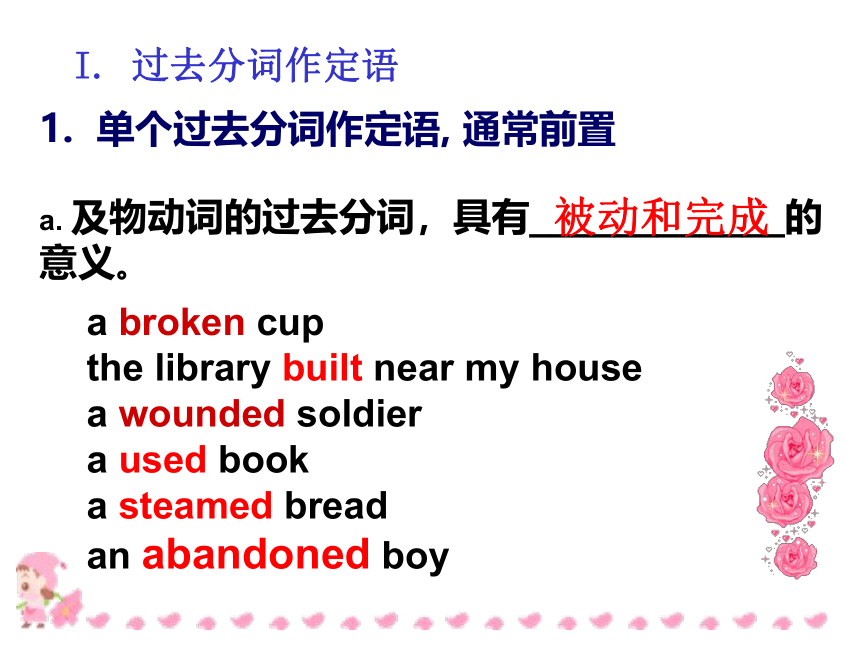
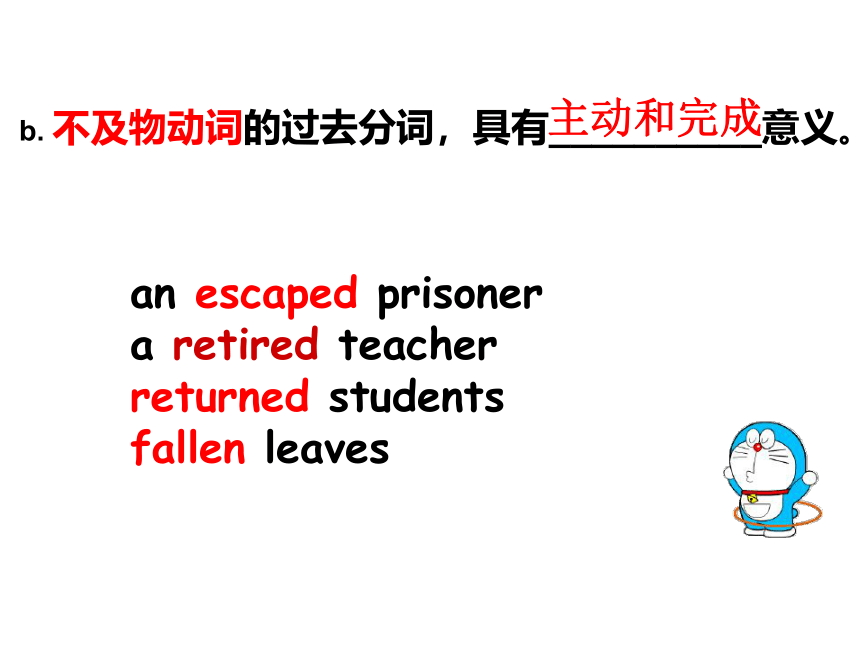
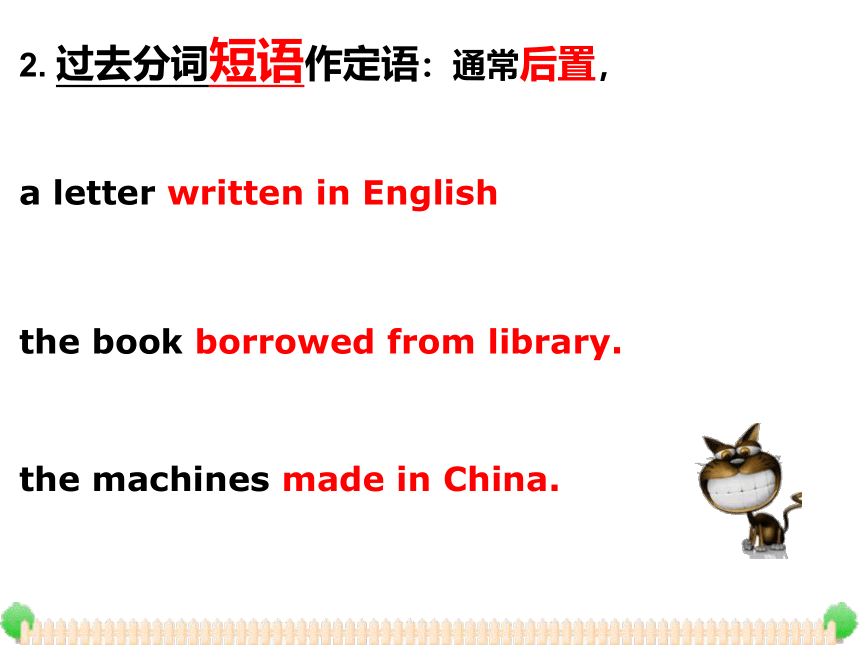
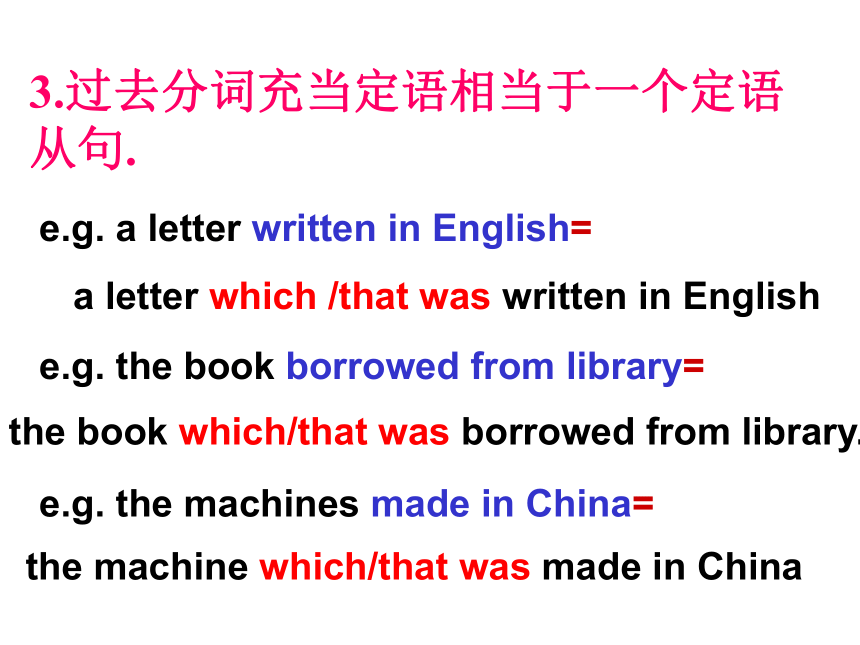
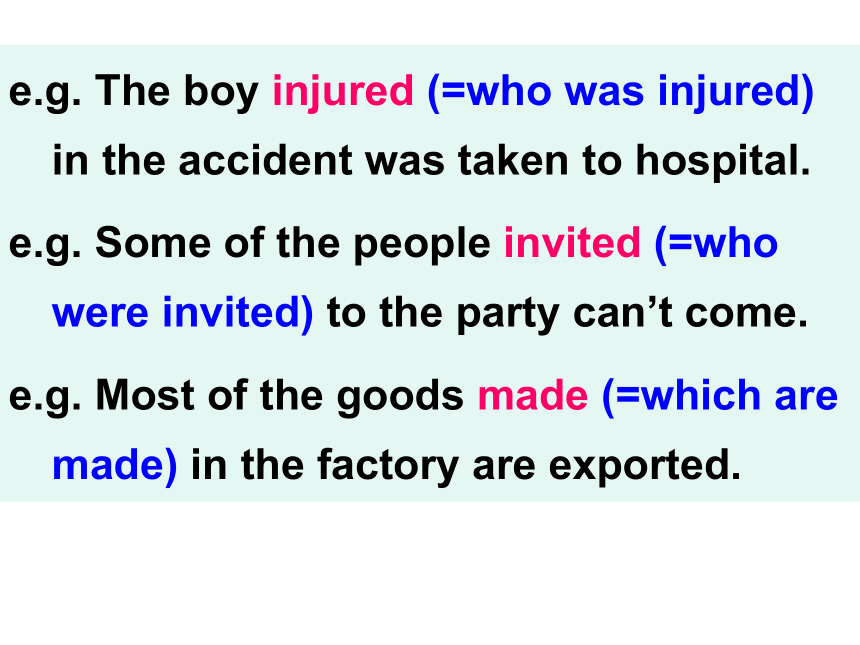
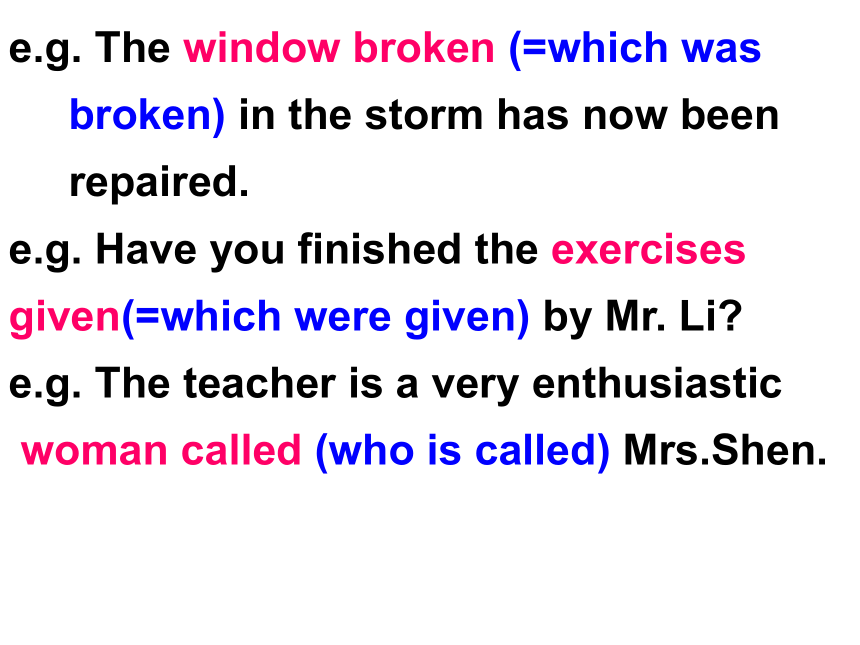
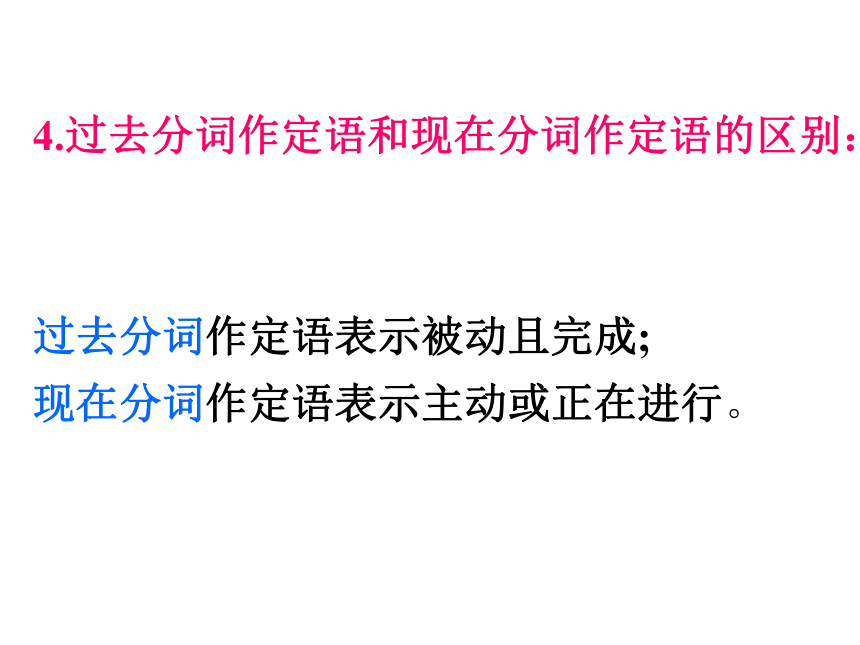
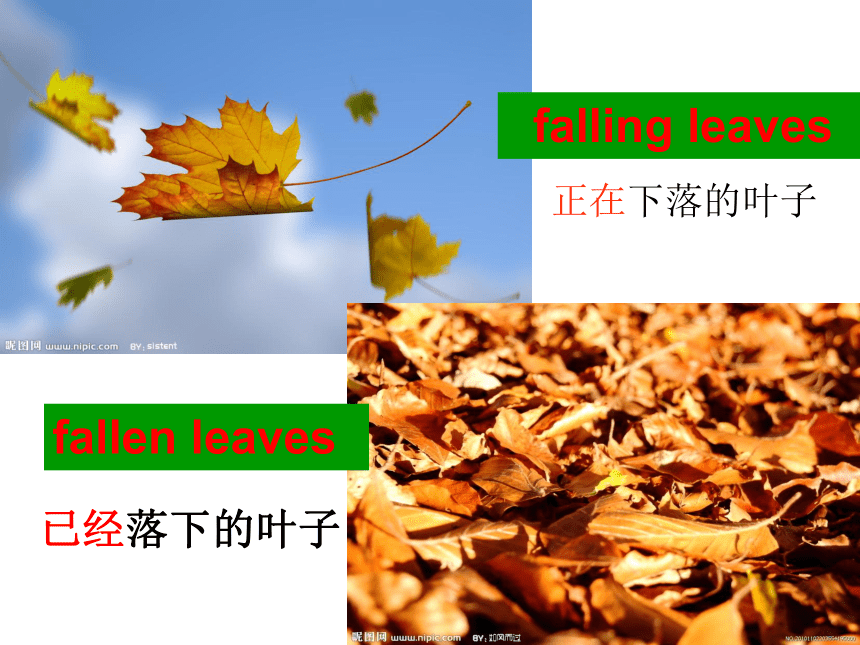
文档简介
(共25张PPT)
–ed form used as attributive adjectives
Grammar I
I. 过去分词作定语
1. 单个过去分词作定语, 通常前置
a. 及物动词的过去分词,具有____________的意义。
a broken cup
the library built near my house
a wounded soldier
a used book
a steamed bread
an abandoned boy
被动和完成
an escaped prisoner
a retired teacher
returned students
fallen leaves
b. 不及物动词的过去分词,具有__________意义。
主动和完成
2. 过去分词短语作定语:通常后置,
a letter written in English
the book borrowed from library.
the machines made in China.
3.过去分词充当定语相当于一个定语从句.
e.g. a letter written in English=
e.g. the book borrowed from library=
e.g. the machines made in China=
a letter which /that was written in English
the book which/that was borrowed from library.
the machine which/that was made in China
e.g. The boy injured (=who was injured) in the accident was taken to hospital.
e.g. Some of the people invited (=who were invited) to the party can’t come.
e.g. Most of the goods made (=which are made) in the factory are exported.
e.g. The window broken (=which was
broken) in the storm has now been
repaired.
e.g. Have you finished the exercises given(=which were given) by Mr. Li
e.g. The teacher is a very enthusiastic
woman called (who is called) Mrs.Shen.
4.过去分词作定语和现在分词作定语的区别:
过去分词作定语表示被动且完成;
现在分词作定语表示主动或正在进行。
falling leaves
正在下落的叶子
fallen leaves
已经落下的叶子
boiling water
boiled water
正在沸腾的水
烧开的水
现在分词和过去分词作定语的区别:
过去分词作定语表示被动、完成;
现在分词作定语表示主动、正在进行。
boiling water 正在开的水 boiled water 已经煮开过的水the changing world 变化中的世界 the changed world 变化了的世界
the developing countries 发展中国家 the developed countries 发达国家
falling snow 正在下的雪 fallen snow 落在地上的雪
Translation
1. The book ___________________ (一本农民写的书) is very popular.
2. The problem _________________________(在昨天会议上讨论的) was very difficult to solve.
3. The people _____________________________((暴露在阳光下的) got sun burnt.
4. Most of the artists_______________ ____ (被邀请去参加聚会的) were from South Africa.
5. The students _________________ ___(受到老师鼓舞的)worked harder than ever before.
written by a farmer
discussed in the meeting
exposed under the sun
invited to the party
encouraged by the teacher
1. There was an ____ look on his face when the actress appeared. A. excited B. excitement
C. exciting D. excitedly
2. It’s wrong for the ___ countries to control the world.
A. development B. developing
C. developed D. develop
Exercises
3. I have collected the money ____. A. needing B. need
C. to need D. needed
4. The bridge ___ next year will be very long.
A. being built B. to be built C. built D. building
5. This is the problem ___ at the meeting
yesterday.
A. being discussed B. having discussed
C. to be discussed D. discussed
6. The ___ look on his face suggested
that he had not expected so.
A. surprised B. surprising C. excited D. exciting
7. Most of the artists _____ to the party were from South Africa.
A. invited B. to invite
C. being invited D. had been invited
8. The computer center, _____last year, is very popular among the students in this school.
open B. opening
C. having opened D. opened
9 _______ English is different from ______ English in many ways.
A. Spoken; written B. Speaking; written
C. Spoken; writing D. Speak; write
10.Linda worked for the Minnesota Manufacturing Mining Company, _____ as 3M.
knowing. B. known.
C. being known. D. to be known
11. The _____ dishes lay on the floor.
A breaking. B. broken. C. broke. D. break
12.The ship,______ by a huge piece of iceberg, stopped suddenly.
A. hitting. B. hit. C. hitted. D. to hit.
13. There is a big dog____ to a fence outside the house.
A. tying. B. tied. C. to tie. D. ties.
8. I was very ____ to find all the tickets had been sold out when I got there.
disappoint B. to disappoint
C. disappointing D. disappointed
9 . --- A woman was killed. --- Where is the body of the ______ woman
murder B. murdered
C. murdering D. having murdered
10. The Olympic Games, ____ in 776 B. C., didn’t include women until 1912.
A. first playing B. to be first played
C. first played D. to be playing
11. What’s the language ____ in Germany
A. speaking B. spoken
C. be spoken D. to speak
12.I became ______ after watching too much television.
bored B. boring C. bore D. bores
14 . She felt rather _______that she shouldn’t drive the car at such a _______ speed.
A. frightening, frightening
B. frightened, frightened
C. frightening, frightened
D. frightened, frightening
15. Mr. Smith, ____ of the ___ speech, started to read a novel.
A. tired; boring B. tiring; bored
C. tired; bored D. tiring; boring
Grammar II
Past Tense Expressions
Past Tense Time Expressions
1. 常用的表示过去的时间状语有:
recently, during the day, one night, a long time ago, until the 1920s, in 1925, for many years, just now, at that time, during his middle school years, then, last night/year/week /month, a week /month/ year ago , in the old days …
Grammar II:
a. I played football every week when I
was young.
我年轻的时候每周都踢足球。
b. I used to go shopping during
weekdays.
我以前在工作日经常购物。
2. 表示过去的习惯性、重复性的动作,常用一定的时间状语或频度状语。
1. 上周末,简吃了一顿由外婆做的好饭。
2. 昨天晚上,她完成作业后就上床睡觉了。
3. 前几天,罗伯特去北京出差了。
4. 玛丽过去一周来拜访我一次。
5. 我是最近才开始学法语的。
汉译英
1. Last weekend, Jane ate a nice meal
(which was) cooked by her grandmother.
2. She went to bed after she finished her
homework last night.
3. Robert went to Beijing on business the other day.
4. Mary used to pay a visit to/visit me once a week.
5. I’ve only recently started learning French.
–ed form used as attributive adjectives
Grammar I
I. 过去分词作定语
1. 单个过去分词作定语, 通常前置
a. 及物动词的过去分词,具有____________的意义。
a broken cup
the library built near my house
a wounded soldier
a used book
a steamed bread
an abandoned boy
被动和完成
an escaped prisoner
a retired teacher
returned students
fallen leaves
b. 不及物动词的过去分词,具有__________意义。
主动和完成
2. 过去分词短语作定语:通常后置,
a letter written in English
the book borrowed from library.
the machines made in China.
3.过去分词充当定语相当于一个定语从句.
e.g. a letter written in English=
e.g. the book borrowed from library=
e.g. the machines made in China=
a letter which /that was written in English
the book which/that was borrowed from library.
the machine which/that was made in China
e.g. The boy injured (=who was injured) in the accident was taken to hospital.
e.g. Some of the people invited (=who were invited) to the party can’t come.
e.g. Most of the goods made (=which are made) in the factory are exported.
e.g. The window broken (=which was
broken) in the storm has now been
repaired.
e.g. Have you finished the exercises given(=which were given) by Mr. Li
e.g. The teacher is a very enthusiastic
woman called (who is called) Mrs.Shen.
4.过去分词作定语和现在分词作定语的区别:
过去分词作定语表示被动且完成;
现在分词作定语表示主动或正在进行。
falling leaves
正在下落的叶子
fallen leaves
已经落下的叶子
boiling water
boiled water
正在沸腾的水
烧开的水
现在分词和过去分词作定语的区别:
过去分词作定语表示被动、完成;
现在分词作定语表示主动、正在进行。
boiling water 正在开的水 boiled water 已经煮开过的水the changing world 变化中的世界 the changed world 变化了的世界
the developing countries 发展中国家 the developed countries 发达国家
falling snow 正在下的雪 fallen snow 落在地上的雪
Translation
1. The book ___________________ (一本农民写的书) is very popular.
2. The problem _________________________(在昨天会议上讨论的) was very difficult to solve.
3. The people _____________________________((暴露在阳光下的) got sun burnt.
4. Most of the artists_______________ ____ (被邀请去参加聚会的) were from South Africa.
5. The students _________________ ___(受到老师鼓舞的)worked harder than ever before.
written by a farmer
discussed in the meeting
exposed under the sun
invited to the party
encouraged by the teacher
1. There was an ____ look on his face when the actress appeared. A. excited B. excitement
C. exciting D. excitedly
2. It’s wrong for the ___ countries to control the world.
A. development B. developing
C. developed D. develop
Exercises
3. I have collected the money ____. A. needing B. need
C. to need D. needed
4. The bridge ___ next year will be very long.
A. being built B. to be built C. built D. building
5. This is the problem ___ at the meeting
yesterday.
A. being discussed B. having discussed
C. to be discussed D. discussed
6. The ___ look on his face suggested
that he had not expected so.
A. surprised B. surprising C. excited D. exciting
7. Most of the artists _____ to the party were from South Africa.
A. invited B. to invite
C. being invited D. had been invited
8. The computer center, _____last year, is very popular among the students in this school.
open B. opening
C. having opened D. opened
9 _______ English is different from ______ English in many ways.
A. Spoken; written B. Speaking; written
C. Spoken; writing D. Speak; write
10.Linda worked for the Minnesota Manufacturing Mining Company, _____ as 3M.
knowing. B. known.
C. being known. D. to be known
11. The _____ dishes lay on the floor.
A breaking. B. broken. C. broke. D. break
12.The ship,______ by a huge piece of iceberg, stopped suddenly.
A. hitting. B. hit. C. hitted. D. to hit.
13. There is a big dog____ to a fence outside the house.
A. tying. B. tied. C. to tie. D. ties.
8. I was very ____ to find all the tickets had been sold out when I got there.
disappoint B. to disappoint
C. disappointing D. disappointed
9 . --- A woman was killed. --- Where is the body of the ______ woman
murder B. murdered
C. murdering D. having murdered
10. The Olympic Games, ____ in 776 B. C., didn’t include women until 1912.
A. first playing B. to be first played
C. first played D. to be playing
11. What’s the language ____ in Germany
A. speaking B. spoken
C. be spoken D. to speak
12.I became ______ after watching too much television.
bored B. boring C. bore D. bores
14 . She felt rather _______that she shouldn’t drive the car at such a _______ speed.
A. frightening, frightening
B. frightened, frightened
C. frightening, frightened
D. frightened, frightening
15. Mr. Smith, ____ of the ___ speech, started to read a novel.
A. tired; boring B. tiring; bored
C. tired; bored D. tiring; boring
Grammar II
Past Tense Expressions
Past Tense Time Expressions
1. 常用的表示过去的时间状语有:
recently, during the day, one night, a long time ago, until the 1920s, in 1925, for many years, just now, at that time, during his middle school years, then, last night/year/week /month, a week /month/ year ago , in the old days …
Grammar II:
a. I played football every week when I
was young.
我年轻的时候每周都踢足球。
b. I used to go shopping during
weekdays.
我以前在工作日经常购物。
2. 表示过去的习惯性、重复性的动作,常用一定的时间状语或频度状语。
1. 上周末,简吃了一顿由外婆做的好饭。
2. 昨天晚上,她完成作业后就上床睡觉了。
3. 前几天,罗伯特去北京出差了。
4. 玛丽过去一周来拜访我一次。
5. 我是最近才开始学法语的。
汉译英
1. Last weekend, Jane ate a nice meal
(which was) cooked by her grandmother.
2. She went to bed after she finished her
homework last night.
3. Robert went to Beijing on business the other day.
4. Mary used to pay a visit to/visit me once a week.
5. I’ve only recently started learning French.
